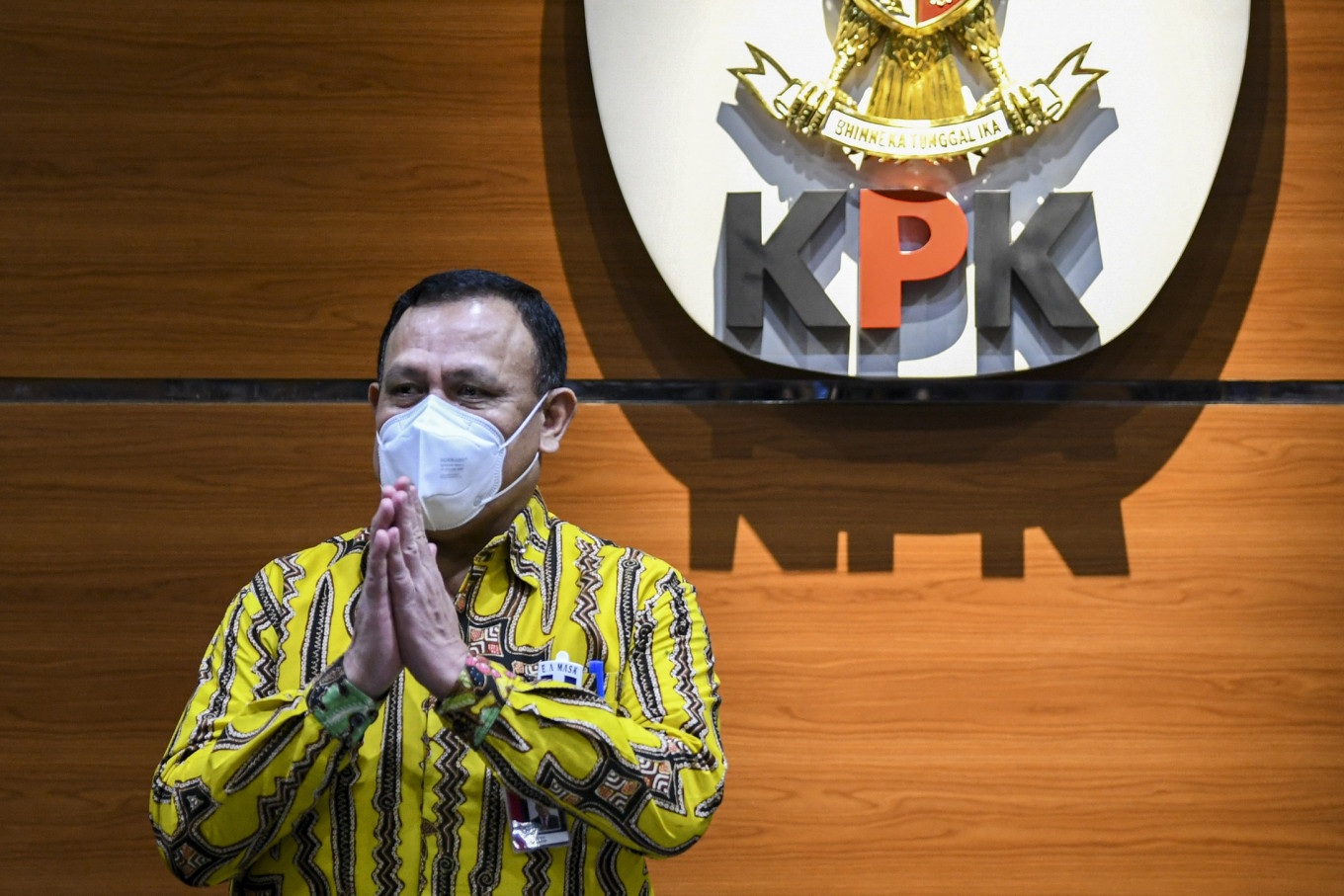Popular Reads
Top Results
Can't find what you're looking for?
View all search resultsPopular Reads
Top Results
Can't find what you're looking for?
View all search resultsNew KPK officialʼs ʻrestorative justiceʼ plan raises eyebrows
The appointment of a former prosecutor who is sympathetic to the idea of lighter punishment for graft convicts to the ranks of the Corruption Eradication Commission (KPK) has sparked concern.
Change text size
Gift Premium Articles
to Anyone
I
ncoming Corruption Eradication Commission (KPK) commissioner Johanis Tanak’s plans for “restorative justice” for graft convicts have irked critics, who say it betrays a cavalier attitude toward enforcement, as he prepares to replace a commissioner who narrowly escaped an ethics probe.
At his confirmation hearing on Wednesday, Johanis told House of Representatives Commission III overseeing legal affairs that he would propose the use of restorative justice when prosecuting graft cases.
The former prosecutor, who previously worked under the assistant attorney general for civil and state administration, won 38 votes from 53 lawmakers in attendance to win the KPK job. His opponent, auditor I Nyoman Wara, only secured 14 votes from the legislators.
Johanis’ remarks were sharply criticized by antigraft activists, with some questioning his understanding of the work that the KPK should be doing.
Indonesian Corruption Watch (ICW) researcher Lalola Easter told The Jakarta Post that restorative justice should not be implemented to resolve graft cases, which caused massive losses to the state and were committed by people with access to power and authority.
“I don’t think he understands that corruption is categorized as a special crime,” she said on Wednesday.
Another corruption analyst, Yuris Rezha Kurniawan of the Gadjah Mada University’s Center for Corruption Studies (UGM-PUKAT) said the comment suggested an attitude toward graft that was unfit for a KPK leader. Johanis, he said, should instead be encouraging strict law enforcement against graft.
“Restorative justice won’t be effective these days if used to eradicate corruption. As a KPK leader, he would be better off encouraging the ratification of the Asset Confiscation Law, or the implementation of an article therein on illicit enrichment, so that the prosecution of graft cases can be thoroughly carried out,” he told the Post on Thursday.
Johanis was elected to fill a gap in the KPK’s top ranks after former commissioner Lili Pintauli Siregar resigned in July, escaping allegations of ethics violations.
Lili was in hot water after she was reported to the KPK’s supervisory board for allegedly accepting gratuities in the form of airfares and a hotel stay to attend the MotoGP Pertamina Grand Prix in Mandalika, West Nusa Tenggara, in March.
President Joko “Jokowi” Widodo had proposed Johanis and Wara from a list of five candidates for the position who had passed a round of public confirmation hearings in 2019. It was for that reason that lawmakers skipped the typical interview session with the two candidates and named a replacement within three hours.
Lalola said the brief selection process was a mere formality because, in the past, lawmakers would have wanted to reexamine candidates even if they had been screened three years earlier.
The antigraft activist was unconvinced that filling Lili’s spot with a new commissioner would bring significant changes to the nation’s flagging antigraft movement, with the KPK leadership under chairman Firli Bahuri widely criticized for defanging the body.
“ICW has many critical notes on the KPK’s performance under Firli. Adding one more figure to the roster will not change the KPK’s performance,” she said.
Firli welcomed Johanis’ appointment.
“Welcome and congratulations on joining the KPK’s ranks. Let’s wash this country clean of corruption,” he said on Wednesday.
The government has been accused of going soft on corruption, most recently following the Law and Human Rights Ministry’s granting of early parole to 23 graft convicts, sparking outrage among antigraft activists.
Parole was granted not long after the 2022 Corrections Law revision, which established the possibility of sentence remissions for graft convicts. The law was passed in response to the Supreme Court’s decision in October 2021 to declare Government Regulation (PP) No. 99/2012, which set more strict corruption enforcement standards, unconstitutional.










